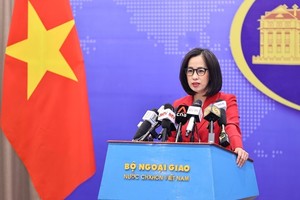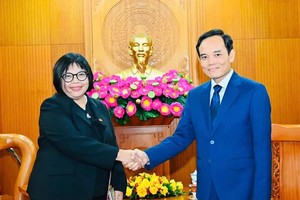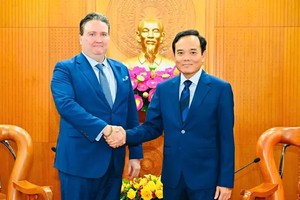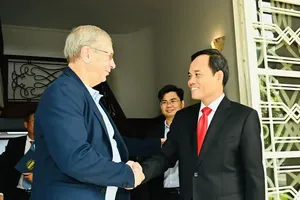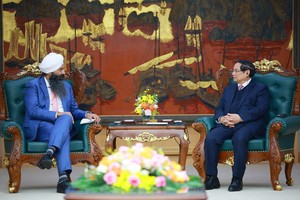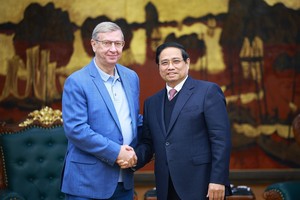US President Barack Obama and his Russian counterpart Dmitry Medvedev finalized a historic new deal to cut long-range nuclear arms, slashing the number of deployed warheads by a third.
After months of intense negotiations, the pair sealed what Obama called "the most comprehensive arms control agreement in nearly two decades," as they hailed improved ties that hit a low under US president George W. Bush.
The new pact, due to be signed April 8 in Prague by both the presidents of the former Cold War foes, replaces the landmark 1991 Strategic Arms Reduction Treaty (START), which expired in December.
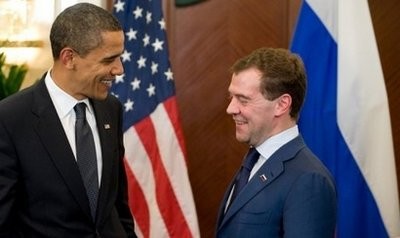
In the Czech capital last year, Obama unveiled a plan to purge the world of atomic weapons by cutting stockpiles, curtailing testing, choking fissile production and securing loose nuclear material. Facts: Arms treay will scale back US, Russia nuclear arsenal
Obama -- standing Friday next to Secretary of State Hillary Clinton, Defense Secretary Robert Gates and other key officials -- stressed that the new START treaty was a "fundamental part of that effort" for a nuclear-free world.
He said the deal also advances his priority to "reset" ties between the two countries, which have deepened cooperation on the US-led war against Muslim extremists in Afghanistan and on efforts to curb Iran's nuclear ambitions.
In Moscow, the Kremlin said "the presidents agreed that the new treaty marks the transfer of Russian-US cooperation to a higher level in the development of new strategic ties."
The Union of Concerned Scientists (UCS) warmly welcomed the treaty.
"This treaty will send a powerful, unambiguous message to the rest of the world that the United States and Russia are serious about reducing the nuclear threat," the UCS's Sean Meyer said in a statement.
"And the timing couldn't be better, given President Obama is hosting an international nuclear security summit in April and the Nuclear Non-Proliferation Treaty review conference in May," he said.
Obama said the treaty "significantly reduces" US and Russian missiles and launchers, and sets up a "strong and effective" verification regime.
It specifies limits of 1,550 deployed warheads, which is about 30 percent lower than a previous upper warhead limit set in 2002.
The UCS said the new treaty counts each deployed missile warhead as one, and each deployed bomber as one warhead, and under these rules, currently the United States has 1,762 warheads and Russia has 1,741.
"The treaty does not cover the thousands of warheads both countries have in storage," it said in a statement.
The treaty limits missile forces to 800 deployed and non-deployed intercontinental ballistic missile launchers, submarine launched ballistic missile launchers, and heavy bombers equipped for nuclear weapons.
The cap on deployed intercontinental ballistic missiles and submarine launched missiles is set at 700, the White House said.
Clinton, who traveled to Moscow last week in a bid to clear the last hurdles to the deal, said she was "confident" the Obama administration would be able to convince the Senate to ratify the treaty.
A senior State Department official said the treaty will be "submitted for ratification in late spring."
Obama's Senate ally John Kerry, who chairs the chamber's foreign relations committee, urged Republicans to end the feuding.
"We can't squander this opportunity to reset both our relations with Russia and our role as the world leader on nuclear nonproliferation," he said.
Republican senators, who could deny the administration the two-thirds majority needed for ratification, vowed to closely examine the document, although key Republican Richard Lugar appeared to back the deal.
Republicans have warned they will not support any deal that harms US missile defense systems, and have said they want a detailed plan for modernizing the US nuclear weapons stockpile before taking up the new treaty.
But Gates said the treaty does not set constraints on US plans to develop and improve missile defense systems.
Russian Foreign Minister Sergei Lavrov meanwhile made it clear that Moscow could back out if the United States went too far with its plans to counter missile attacks by setting up defenses in eastern Europe.
Moscow has strongly opposed US missile defense plans and has long insisted on an explicit recognition of the link between offensive and defensive systems in any new strategic arms pact.
Australia Saturday hailed the "landmark" agreement, calling it a major step towards the eventual goal of global disarmament.
Foreign Minister Stephen Smith congratulated Obama and Medvedev on the historic accord.
"The new START agreement provides for substantial reductions in the numbers of nuclear weapons and ballistic missile launchers deployed by the United States and Russia," Smith said in a statement.
Provided the treaty is ratified, the agreement will hand Obama his second major political victory in a week after he signed his landmark health care overhaul into law on Tuesday.
Signed in 1991, START led to huge reductions in the Russian and US nuclear arsenals and imposed verification measures to build trust between the two former Cold War foes.
